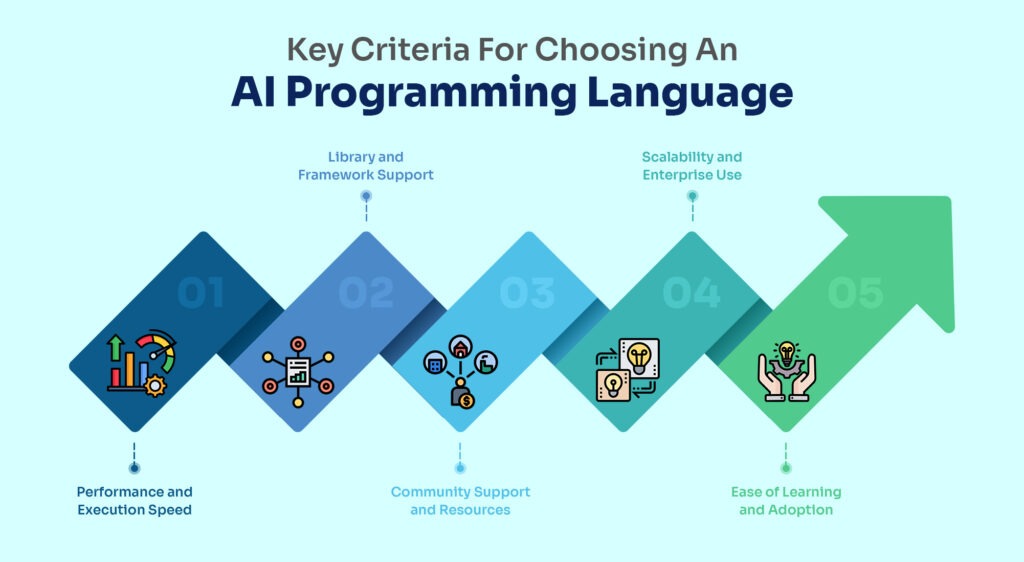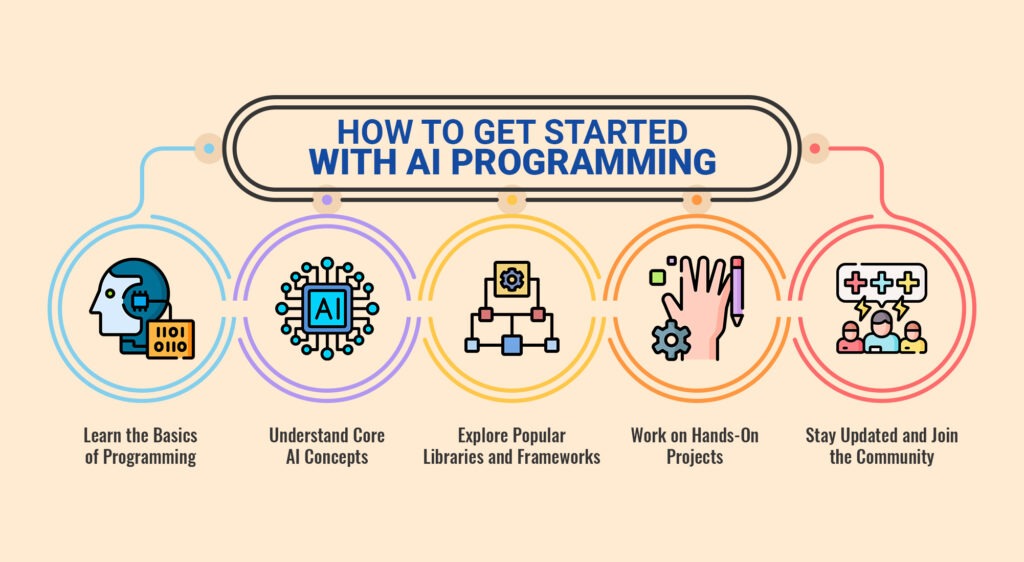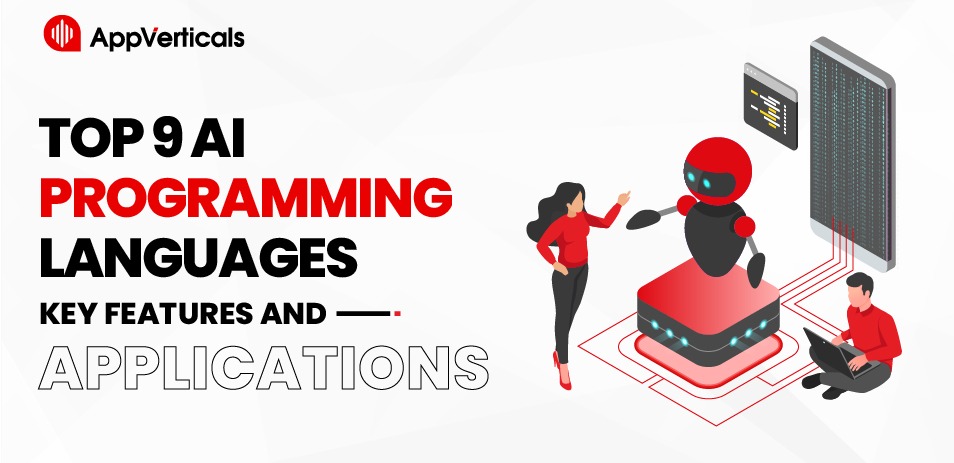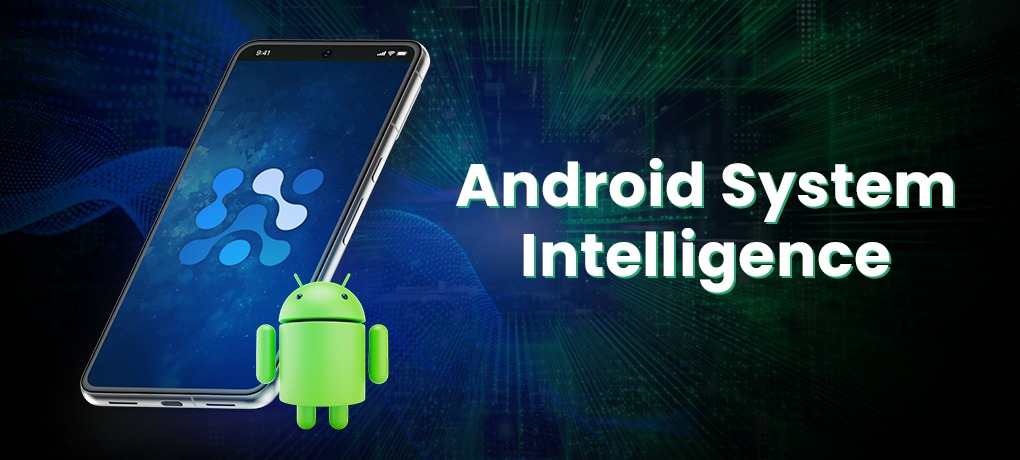Artificial Intelligence (AI) is changing how industries like healthcare, finance, and automotive solve problems.
At its core, AI relies on programming languages that help developers:
- Create and improve models for tasks like language translation.
- Making predictions.
- Data analyses.
That’s why choosing the right AI programming language is important.
Looking for the Best AI programming language for your project? You’re in the right place. Here, we’ll discuss the top 9 AI programming languages, their features, and how they’re used in real life.
These languages are also key for an app development company to create smart, AI-driven solutions. Whether you’re a beginner or a tech enthusiast, understanding these tools will help you unlock AI’s potential.
Let’s discuss!
Key Criteria for Choosing An AI Programming Language
Choosing the right AI programming language is important for top-quality development. Here are the main things to consider when making your decision:

1. Performance and Speed
AI tasks involve a lot of data and calculations that often require fast processing. Because of its speed, C++ is great for applications like robotics or computer vision. Similarly, Python is popular for its balance between speed and ease of use, which is enough for most AI tasks.
2. Libraries and Frameworks
Strong libraries and frameworks make it easier to work with AI and machine learning. Python leads with tools like TensorFlow, PyTorch, and scikit-learn. Java is another option with frameworks like DL4J, while R is well-known for its statistical packages.
3. Community and Support
A helpful developer community makes it easier to learn and solve problems. Python and Java have large, active communities with plenty of resources like forums and tutorials. Julia and R are growing in popularity, especially among data scientists, and also have helpful communities.
4. Scalability for Big Projects
AI applications sometimes need to work on big datasets and across different systems. Java is strong in enterprise AI projects because of its scalability. Scala, often paired with Apache Spark, is great for managing big data and distributed systems.
5. Ease of Learning
If you’re new to programming, picking an easy-to-learn language matters. Python is beginner-friendly with simple syntax, while Haskell may take more time to master. Speed, libraries, support, scalability, and learning ease help you choose the best AI programming language to effectively meet your project’s goals!
Best AI Programming Languages
Let’s have a look at the top 9 AI programming languages with their key features, applications, and why they are best:
1. Python

Python is one of the most popular languages for AI development because it is simple to read and write. It has a wide range of libraries, such as TensorFlow, PyTorch, scikit-learn, and Keras. These libraries make it easy for developers to build neural networks, analyze data, and create deep learning models.
Applications
Python is used for tasks like natural language processing (NLP), image recognition, and predictive analytics. It powers chatbots, recommendation systems, and tools like virtual assistants. Its flexibility also makes it a good choice for applications like self-driving cars and healthcare AI systems.
Why Is Python the Best AI Programming Language?
Python’s beginner-friendly syntax and large developer community make it a top choice for AI projects. Its rich ecosystem of tools and ongoing improvements keep it relevant for both research and real-world applications. It also ensures you have plenty of support and resources to rely on.
Get the Top-Notch Python Expertise Near You!
Build Strong and Scalable Applications.
Hire A Python Developer2. Java

Java is a powerful language for AI development because it works on many platforms, is scalable, and uses memory efficiently. Its object-oriented structure is great for large AI projects.
Java also comes with useful tools like Weka, DL4J (Deep Learning for Java), and Java-ML, which help developers create machine learning models, natural language tools, and neural networks with ease.
Applications
Java is used for business AI, such as fraud detection, credit risk assessment, and chatbots.
It’s also excellent for building secure AI systems. Additionally, Java works well with big data tools like Apache Hadoop and Apache Spark, making it perfect for handling large amounts of data.
Why Is Java Best for AI Development?
Java is very flexible and can run on different devices and operating systems. It also supports multi-threading to handle multiple tasks simultaneously, making Java a great choice for scalable and fast AI projects.
Power Your Projects with Java.
Our Expert Java Development Service Is A Call Away.
Hire A Java Developer3. C++

C++ is a fast and powerful language. It gives developers more control over the system’s resources, which helps speed up processes. This makes it a good choice for AI tasks that need to work quickly.
C++ also has helpful libraries like MLPACK and frameworks such as Shogun. They make the development of machine learning models easier and more efficient.
Applications:
C++ is often used in areas like game AI, robotics, and real-time systems.
It’s also used in self-driving cars and in environments where speed and low energy use are important, like embedded systems and edge AI devices.
Why Is C++ The Best AI Programming Language?
C++ is great for AI applications that need fast processing and low delays, such as simulations and real-time systems. If your AI project needs to be highly efficient and work at high speeds, C++ is the right choice. It helps developers build specialized AI solutions that run quickly and effectively.
4. R

R is a powerful programming language specifically designed for statistics and data analysis. It comes with a huge collection of libraries, such as caret, randomForest, and e1071, which are perfect for handling and analyzing data.
R is especially useful for tasks that involve statistical modeling, data visualization, and exploring large datasets. Its strengths lie in its ability to manage complex data and present it visually, it is a popular choice for data scientists working with machine learning.
Applications:
R is widely used in areas like data analysis, statistical modeling, and machine learning. It’s commonly found in industries like healthcare, finance, and market research, where working with complex data is crucial.
For instance, in healthcare, R helps with tasks like genetic data analysis, clinical trial modeling, and predicting patient outcomes.
Why Is R The Best for AI Programming?
R’s ability to handle complex datasets, along with its advanced statistical functions, makes it an excellent choice for AI tasks. It’s especially useful for AI developers who need deep insights from data and need to preprocess and model it efficiently. Whether you’re working with large amounts of data or need detailed statistical analysis, R offers the right tools for the job.
5. Julia

Julia is a high-performance programming language designed for tasks that need heavy math and data work. It’s a great choice for AI because it combines Python’s easy-to-understand syntax with the fast processing power of C. This allows Julia to handle large amounts of data quickly.
Julia also has powerful libraries, such as Flux.jl and Knet.jl for deep learning and DataFrames.jl for data analysis, which make machine learning projects faster and easier.
Applications:
Julia is used in fields like scientific computing, data analysis, and machine learning. It is especially good for AI projects in industries such as finance, healthcare, genomics, and engineering, where you need to handle lots of data and make real-time decisions.
Julia is becoming more popular for building AI models, especially when quick processing is needed for predictive analytics and data-driven solutions.
Why Is Julia The Best Choice?
Julia is a great choice for AI because it offers the speed of lower-level languages and the ease of high-level ones. It’s ideal for tasks that require lots of math or data processing, which is common in AI. Julia also supports parallel computing, meaning it can run multiple tasks at the same time, making it even more efficient. With its growing community and strong features, Julia is quickly becoming a favorite for AI development.
6. JavaScript

JavaScript is mainly known for web development, but it’s also becoming a useful language for AI development. It can run on both servers and browsers, making it perfect for interactive AI web applications.
JavaScript uses powerful libraries like TensorFlow.js and Brain.js that help with machine learning and neural networks. These libraries allow AI models to run directly in the browser, giving users real-time updates.
Applications:
JavaScript is widely used for AI in web-based applications, making it a favorite for app development companies. It’s commonly used for building chatbots, recommendation systems, and predictive analytics. With TensorFlow.js, developers can create AI models right in the browser, while Brain.js is great for building neural networks.
Why Is Javascript The Best AI Programming Language?
Although JavaScript isn’t as powerful as languages like Python for AI, it’s a great choice for web-based AI applications. Its easy-to-learn syntax and powerful libraries like TensorFlow.js allow developers to build smart models that work well in browsers, making JavaScript a good option for creating interactive AI applications.
AppVerticals Provides Top-Notch Javascript Expertise!
Build Strong and Scalable Web and Mobile Applications.
Hire A JavaScript Developer7. Scala for AI Development

Scala is a programming language that blends both functional and object-oriented programming. This combination makes it a flexible and powerful tool for AI development. Scala runs on the Java Virtual Machine (JVM), which allows it to work smoothly with Java libraries.
It’s designed for parallel and distributed processing, meaning it can handle tasks that require large-scale data analysis. Scala also has strong libraries like Breeze for numerical processing and Spark MLlib for machine learning, which helps improve its performance in AI and big data projects.
Applications:
Scala is widely used for big data AI applications, especially those that rely on Apache Spark for distributed data processing. It’s great for handling large datasets and performing tasks like predictive modeling and data mining. You’ll find it used in industries such as finance, retail, and telecommunications, where AI helps to gain insights from large amounts of data.
Why Is Scala A Good Option for AI Development:
Scala’s ability to work with Apache Spark and its support for functional programming makes it an excellent choice for building scalable and distributed AI applications. It’s highly effective in situations involving real-time analytics and big data, making it ideal for AI systems that need to process large amounts of data quickly and efficiently.
8. Haskell

Haskell is a programming language that focuses on using functions to solve problems without changing data. This makes it great for AI tasks that involve math and logic.
Haskell has a strong system for organizing data and processes, and its unique way of handling computations helps developers write clear and efficient code. Helpful libraries like HLearn and Accelerate make building machine learning models and handling complex calculations easier.
Applications:
Haskell is used in AI research, particularly for developing systems that deal with logic, such as symbolic AI and knowledge representation. It is also used in areas like natural language processing (NLP), where its math-based approach helps in designing and optimizing algorithms.
Why To Choose Haskell For AI Development:
Haskell’s focus on writing clean, reliable code makes it perfect for AI applications that require detailed algorithms and calculations. Its ability to handle complex data and math-heavy tasks makes it a strong choice for AI developers working on advanced projects.
9. Prolog

Prolog is a programming language mainly used for AI tasks that involve logic and reasoning. Unlike other languages, Prolog works by setting up rules and facts, which the system uses to make decisions. This makes it ideal for AI applications like expert systems and solving problems where you need to reason about different possibilities. Prolog uses powerful techniques like backward and forward chaining to find solutions.
Applications:
Prolog is used in areas like expert systems, which help computers make decisions like human experts, and natural language processing (NLP), which helps computers understand and interpret human language. It’s also useful for creating systems that need to solve problems or make logical conclusions based on given facts.
Why Is Prolog An Excellent AI Programming Language?
Prolog allows developers to create systems that can make decisions by following a set of rules. It’s one of the best programming languages for AI in areas like knowledge systems, expert systems, and symbolic reasoning. Prolog is a great choice when you need AI to think logically, making it a valuable tool for developers working on specific AI tasks.
How to Get Started with AI Programming
Starting with AI programming can feel overwhelming because of all the languages, tools, and libraries out there. However, breaking down the learning process into smaller steps will help make it more manageable and fun.

1. Learn the Basics of Programming
Before jumping into AI, it’s important to know at least one programming language well. Python is a great place to start because it’s simple to understand and has many AI libraries.
Other languages like Java and C++ are also used in AI, but Python is often the best choice for beginners. It’s easy to learn and has powerful libraries like TensorFlow, PyTorch, and Keras that make AI development smoother.
2. Understand Core AI Concepts
To build AI systems, you need to understand some basic ideas. Start by learning these:
- Machine Learning (ML)
- Deep Learning
- Natural Language Processing (NLP)
- Computer Vision
You can learn these topics through free or paid courses on apps like Coursera and similar.
2. Explore Popular Libraries and Frameworks
AI development requires tools called libraries, which have ready-made code to help you build AI systems faster. Starting with Python and its libraries is a smart choice, as they are some of the most widely used tools in the AI world.
3. Work on Hands-On Projects
Start with smaller projects, like creating a chatbot or a simple recommendation system.
Once you master these, you can move on to bigger projects, like image recognition or even training a model to drive a car!
Websites like Kaggle offer datasets you can use to build your projects. You can also check out projects on GitHub to see how other developers are building their AI applications.
4. Stay Updated and Join the Community
Follow research journals and attend conferences like NeurIPS and ICML to stay up-to-date on the latest breakthroughs. You can also join online forums like Stack Overflow, Reddit’s r/MachineLearning, or AI-specific groups to ask questions, share your projects, and connect with other AI learners.
Also Read: AI For Mobile App Development
A Comparison of Top AI Programming Languages
| Language | Strengths | Weaknesses | Use Cases |
| Python | Simple, versatile, extensive libraries | Slower performance compared to compiled languages | Machine learning, data science, web development |
| Java | Mature, scalable, strong community support, enterprise-ready | Verbose syntax, slower startup time | Large-scale AI applications, enterprise systems |
| C++ | High performance, system-level control | Complex syntax, steep learning curve | AI hardware, real-time systems, game development |
| R | Statistical computing, data analysis, machine learning | Steep learning curve for non-statisticians | Data science, bioinformatics, financial analysis |
| Julia | High performance, numerical computing, machine learning | Smaller community, less mature ecosystem | Scientific computing, data science, machine learning |
| Scala | Functional programming, interoperable with Java, high performance | Steep learning curve, complex syntax | Big data processing, machine learning pipelines |
| Prolog | Symbolic AI, logical programming | Niche language, steep learning curve | Knowledge representation, natural language processing |
| Haskell | Functional programming, strong type system, formal verification | Steep learning curve, less popular | Functional programming, formal verification, AI research |
Wrapping it Up!
Choosing the right programming language is an important step in building successful AI projects. Python is a popular choice because it’s easy to learn and offers powerful libraries for machine learning and AI tasks. For projects that need high performance, C++ is a strong option, while Java works well for scalable, enterprise-level solutions. Languages like R and Julia shine in data analysis and scientific computing, while Prolog and Haskell cater to specialized AI tasks like logic programming and symbolic reasoning.
The key is to understand your project needs and match them with the strengths of each language. With the right tools and a clear plan, you can harness the power of artificial intelligence to create impactful solutions. Whether you’re a beginner or an experienced developer, these languages will help you thrive in the growing field of AI programming.
Need Further Assistance? Contact Us!
FAQs – AI Programming Languages
What Language is AI Written In?
AI can be written in various languages, depending on the application and requirements. Python dominates because of its simplicity and vast libraries. For systems requiring high performance, C++ is a popular choice. Prolog and Haskell are preferred for logic-based AI. Java is often used in large-scale, production-level AI applications, while R excels in statistical and data-driven AI projects.
What Programming Language is Used for AI?
AI development relies on various programming languages for specific tasks. Python is the most popular due to its simplicity and rich libraries. Java is ideal for scalable enterprise AI, while C++ excels in high-performance tasks like robotics. Each AI programming language is chosen based on project needs, including speed, scalability, and tools.
Which AI is Best for Coding?
If you’re referring to tools that assist in coding with AI, GitHub Copilot, and ChatGPT are some of the best AI tools available. These tools use advanced machine learning to help developers write, debug, and optimize code efficiently. Python remains the best choice for most coding purposes when building AI systems due to its user-friendly syntax and AI-focused libraries.
Which is the best coding language to learn?
The best coding language depends on your goals: Python is beginner-friendly and widely used in AI, data science, and automation. JavaScript is perfect for creating interactive websites. Java works well for mobile apps and enterprise solutions. C++ is ideal for games and performance-heavy tasks. Python is highly recommended for AI and machine learning due to its libraries.








